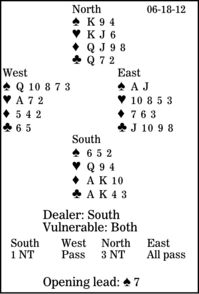Bridge column, June 18: The rule is great, but keep thinking

In bridge, we can rarely say "always" or "never." But there is one always: the Rule of XI.
If the lead is fourth-highest, the Rule of Eleven must work. Subtract the value of the card led from 11, and the result gives the number of cards higher than the one led in the other three hands.
If the lead is a very low card --
a two, three or four -- the rule rarely helps anyone. But when it is a seven or an eight, usually either third hand or declarer benefits from working out who has what.
In this deal, East is in the spotlight. Against three no-trump, West leads a fourth-highest spade seven. After declarer plays low from the dummy, how should East plan the defense?
South is not fond of opening one no-trump with three low spades, but he has no choice.
Seven from 11 is four. And East can see all four of those higher spades: dummy's nine and king, and his jack and ace. So he knows that he can win the first trick with his jack. But what does he do next? Leave by the back door!
East should realize that to beat the contract, the defenders have to establish the spades and hope West regains the lead in time to cash the rest of the suit.
East must win trick one with his ace and return the jack. West overtakes with his queen to dislodge dummy's king. South will try the clubs, hoping for a 3-3 break, but then be forced to lead a heart, which West wins and cashes the rest of his spades. The defenders get one heart and four spades.
** ** **
COPYRIGHT: 2012, UNITED FEATURE SYNDICATE
DISTRIBUTED BY UNIVERSAL UCLICK FOR UFS

